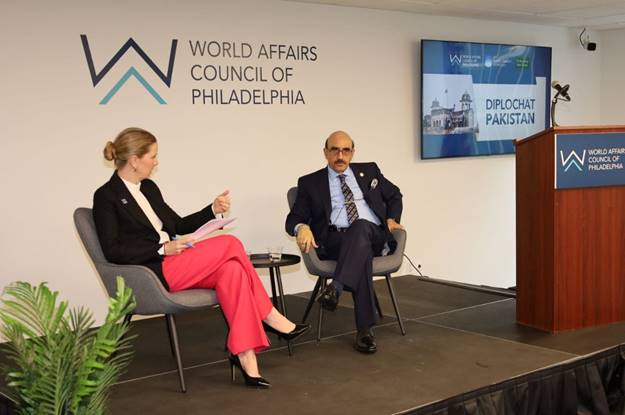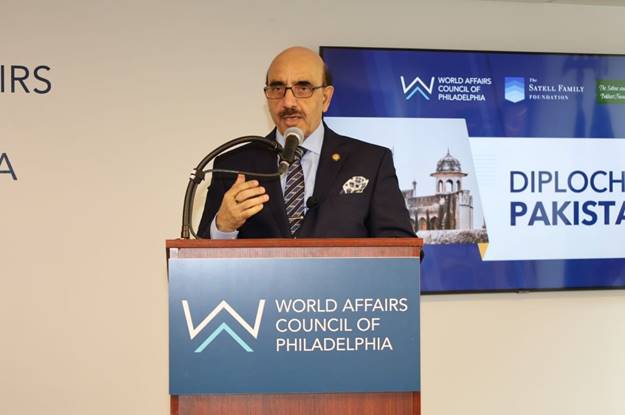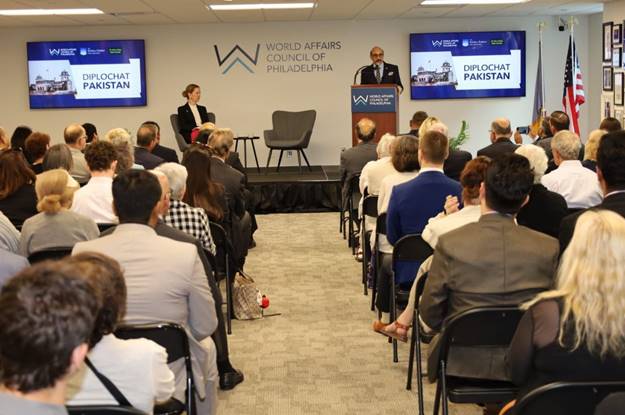


Tracing the roots of Pak-US relations, especially US support during the initial days of Pakistan and the robust partnership of the two countries, both in times of war and peace, the ambassador presented a holistic view of the relationship spanning over seven decades
Pakistan and the US are Investing in People-Centric
Diplomacy: Ambassador Masood Khan
By Elaine Pasquini

Washington: “Pakistan is a big market for American manufacturers,” Masood Khan, Pakistan’s Ambassador to the United States, told a World Affairs Council of Philadelphia audience on June 13, 2024. “If you manufacture state-of-the-art products, you have 240 million consumers in Pakistan.”
There are many exciting investment and trade opportunities between Pakistan and the United States and “if you compare us to all West Asian countries, Pakistan is a big country,” he said. “We have a cohort of human capital and it is growing. It is digitally connected with the rest of the world, and it is tech-savvy. We have hundreds of institutions which are investing in future technologies.”
Founded in 1949, the World Affairs Council of Philadelphia is an influential organization with a strong standing in both the local community and the broader field of international relations and global education. Dedicated to informing and engaging the public on global issues, the Council fosters a deeper understanding of world events and their impact on local and national levels.
Addressing the jam-packed auditorium of scholars, policymakers, legislators, entrepreneurs, business leaders and professionals, the ambassador gave a detailed perspective on Islamabad’s current relationship with Washington, including counterterrorism collaboration, following the withdrawal of US forces from Afghanistan in August 2021.
Tracing the roots of Pak-US relations, especially US support during the initial days of Pakistan and the robust partnership of the two countries, both in times of war and peace, the ambassador presented a holistic view of the relationship spanning over seven decades.
Adding his perspective to the most recent collaboration of the two countries in the war against terror, Ambassador Khan said that although Pakistan was blamed at times for the mission failure, he personally believes the two allies have accomplished a lot in the war against terrorism. “We collaborated and together we broke the backbone of terrorist organizations,” he pointed out. “Al-Qaida is not where it was in 2001-2002. There is awareness all around the world about the asymmetric threat of terrorism to international civilization and how to tackle it.” In this regard, Ambassador Khan emphasized the need for full restoration of foreign military financing and foreign military sales and assistance to fight continued threats from terrorists.
Khan pointed out that in late 2021 and early 2022 the leadership of Pakistan and the United States decided to recalibrate their relationship. They decided that “while we will continue our cooperation in counterterrorism, promote regional stability and maintain a dialogue, we would like to secure the region from any nuclear instability.”
“But at the same time, we would try to invest our time and energy in strengthening the economic partnership between Pakistan and the United States,” he added. “And we have been succeeding in the areas of trade and investment, renewable energy, green technologies, combating climate change, healthcare, education and others.”
The ambassador noted the growing number of Pakistani students presently studying in the United States. “When I came here in 2022 the number of Pakistani students in American universities was 7,000. Now it is more than 10,000,” he said.
“We are investing in people-centered diplomacy so that there are more exchanges of students, academics and entrepreneurs and tech entrepreneurs in particular,” he said. And there is a renewal of agreements between the two countries for cooperation in science and technology.
Highlighting the presence of 80 US companies – mostly Fortune 500 – and the existing potential of the country with bright future prospects, the ambassador urged US businesses to increase their investment portfolios, particularly in tech startups, renewable energy, agriculture and extractive industries.
Referring to recent initiatives, especially the Green Alliance, the ambassador also praised the efforts of Donald Blome, the United States Ambassador in Pakistan, for his proactive approach in promoting cooperation and fostering greater understanding between the two countries.
“Ambassador Donald Blome has been a good partner and a good ambassador in promoting Pak-US relations,” he said.
Speaking about Pakistan’s relations with China, the ambassador reiterated that his country’s relations with China were not at the expense of its ties with the United States. Referring to the historic role played by Pakistan in bringing China and the US closer to each other in the early 70s, he said that Pakistan was willing to play the role of an “economic bridge” between the two countries.
On Pakistan-India relations, Ambassador Khan told the gathering that there hasn’t been any structured dialogue between the two countries since 2014. Underscoring the need to have a result-oriented structured dialogue, Khan said that “we should create that kind of atmosphere for talking to each other.”
Pointing out the strategic imbalance in South Asia with the US tilt towards India, Ambassador Khan urged the US government to follow a balanced approach. Washington’s “heavy tilt towards India is accentuating strategic imbalance which is fraught with serious risks,” he warned.
Discussing issues of regional stability, the ambassador stressed that “Pakistan is pivotal to the ecosystem that comprises the Central Asian states, Afghanistan, Iran, Turkey, the Gulf states, the Middle East and North Africa.”
Thanking Ms Lauren Swartz, president and CEO of the World Affairs Council of Philadelphia, for hosting him, Ambassador Khan invited the group to visit Pakistan and experience for themselves the breathtaking beauty of the country and the traditional hospitality of the Pakistani nation. “Pakistan has 7,500 glaciers which are second in number only to the polar region,” he said. He also added that 70 percent of soccer balls used across the globe were produced in Sialkot, Pakistan, a city which is also known for producing quality surgical instruments.
(Elaine Pasquini is a freelance journalist. Her reports appear in the Washington Report on Middle East Affairs and Nuze.Ink.)

